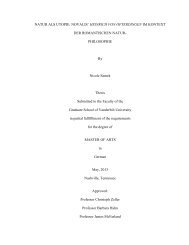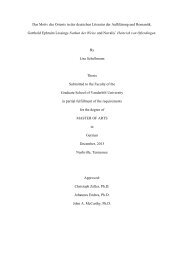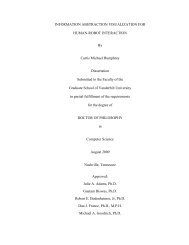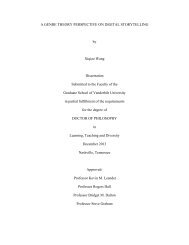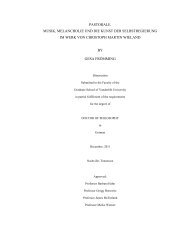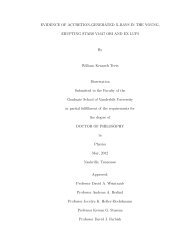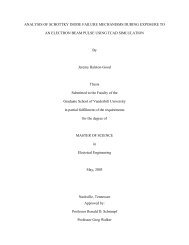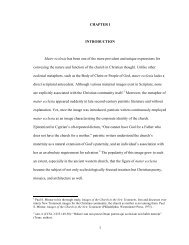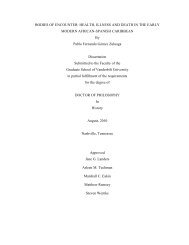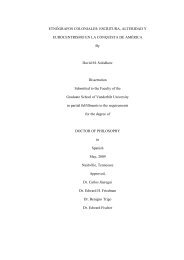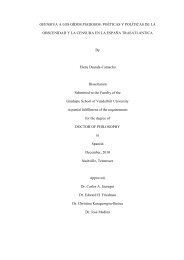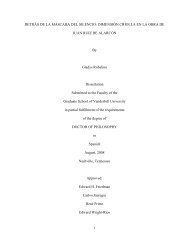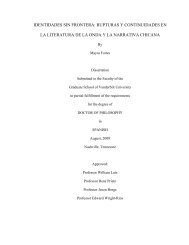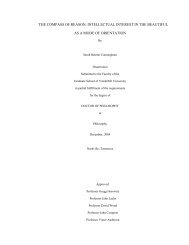THE DEATH OF DIONYSOS - ETD - Vanderbilt University
THE DEATH OF DIONYSOS - ETD - Vanderbilt University
THE DEATH OF DIONYSOS - ETD - Vanderbilt University
Create successful ePaper yourself
Turn your PDF publications into a flip-book with our unique Google optimized e-Paper software.
eing) now and then, his costume is not without its effect on those who matter most: “Die<br />
Frauen beteuerten, diese Tracht lasse ihm vorzüglich gut” [“The women assured him that<br />
the costume suited him perfectly”] (210; EAB 124). The study of Corneille and<br />
neoclassicism had refined Wilhelm’s taste and had taught him how to make a good<br />
impression, especially on the women “in der großen Welt” [“in the world of the great”] of<br />
court life (212; EAB 124). Similarly, his introduction to “‘Shakespeares Welt’”<br />
[“‘Shakespeare’s world’”] prepares him to take on the “‘wirklich[e] Welt’” [“‘the real<br />
world’”], as he assures Jarno (192; EAB 113). Thanks to the aesthetic make-over,<br />
Wilhelm’s personality will qualify him for a short but otherwise legitimate acting career in<br />
the same theater company to which his beloved Mariane had been attached. It takes some<br />
prodding, but Wilhelm finally agrees to perform the lead role in Hamlet. He enjoys<br />
moderate success on stage. Yet personnel changes and an ungrateful public; troubling<br />
reminders of Mariane followed by the death of Aurelie; and not least of all, the fire that<br />
destroys the theater: amid the aftershocks of these upheavals, Wilhelm’s eyes are opened<br />
to the transient, make-believe nature of the theater. It is at this juncture, just when he is<br />
faced with the instability and emptiness of a life on stage, that Wilhelm will enter the<br />
world of Abbé and Lothario. 20<br />
Subjective Experience in “Confessions of a Beautiful Soul”<br />
We would appear to have strayed far from our initial interest, the meaning of<br />
Erfahrung in the novel. But it proved necessary to investigate the reason why Wilhelm<br />
lacks experience and the objective understanding of the world it affords. We have<br />
discovered that he is captive to his myopic imagination; that his attraction to the theater<br />
lay first in his preference of imagination and its representations to the isolation he felt as<br />
an individual in the world. Later Wilhelm becomes aware that his real desire is for self-<br />
cultivation or Bildung, and that he finds acting on stage more conducive to personal<br />
development than production in the marketplace. Finally, in the Tower ceremony he<br />
20 Wilhelm reflects on the emptiness of his experience with the wandering troupe of actors:<br />
“‘[W]enn ich an jene Zeit zurückdenke, die ich mit ihr zugebracht habe, so glaube ich in ein<br />
unendliches Leere zu sehen [. . .]’” (422). [“‘(W)hen I think back on the time I spent with them, I<br />
seem to be peering into an unending void’” (EAB 257).]<br />
15



